We all remember that one special teacher – the very person who ignited our love of learning. Perhaps they inspired you to follow in their footsteps and become an educator. If so, this comprehensive guide for new teachers created by our team is just what you need! Here, we present all the necessary particulars to enter this demanding yet essential career.
But what if you’re unsure if pedagogy fits you? Worry not: we’ll help you settle it. We will also introduce you to all the critical skills and requirements for becoming a terrific teacher and give bonus advice to help you thrive in the field.
💡 Why Become a Teacher?
Teaching is a noble career that benefits learners and whole communities. Teachers play a significant role in changing the future by educating the next generation. A competent educator has the chance to positively influence the lives of over 3,000 students throughout their career. And, of course, this job has many personal advantages for teachers. Here are some of them:
- It offers a predictable and convenient schedule. Teachers usually work in the first half of the day, leaving them plenty of time at home. Summer holidays are another treat.
- It makes every day unique. Teaching is a dynamic job. Each day brings new discoveries and possibilities. Educators engage with all kinds of students and have different classroom experiences.
- This job keeps you energetic. Teaching demands high energy levels. The need to foster a dynamic work environment keeps teachers mentally and physically active.
- It encourages constant learning. If you’re an educator, you’ll learn as much as you teach. Staying updated on educational trends and innovative teaching methods keeps educators intellectually engaged.
- It creates a sense of personal satisfaction. One of the most rewarding aspects of teaching is the self-fulfillment it brings. Indeed, helping students learn and witnessing their achievements is profoundly satisfying.

🎓 Types of Education Specializations
Teachers can specialize in various subjects, focus on different educational stages, and combine teaching courses with administrative functions. Depending on what resonates with you most, you can choose from the options listed below:
- Post-secondary (or tertiary) teachers work in colleges and universities and specialize in various subjects. They facilitate advanced learning, engage in research, and contribute to their academic fields.
- High school or secondary educators work with teenagers in grades 9 to 12. They prepare students for college and give them knowledge and life skills.
- Preschool, kindergarten, and elementary school educators teach kids foundational skills. They create a welcoming place that nurtures a learner’s growth.
- Middle school teachers usually work with students in grades 6 to 8. They typically specialize in one or two subjects and emphasize a comprehensive understanding of the curriculum.
- Special education teachers work with learners with disorders or special conditions, aiming to help them leverage their academic and developmental possibilities.
- English as a Second Language (ESL) teachers help non-native English speakers advance their communication skills, both written and verbal.
- Sports coaches guide athletes in enhancing their talents and performance. They also instill key values such as teamwork and compliance.
- Music teachers train students in instrumental or vocal techniques. Additionally, they teach music theory. They can work in schools or offer private lessons.
- Administration roles in education include principals, superintendents, and other leadership positions. People in these roles manage schools, make policies, and ensure the general efficacy of education.
🖋️ What Does a Teacher Do?
Educators do much more than just transfer knowledge. In fact, you will be performing many diverse functions as a teacher. On the one hand, it will keep you from getting bored. On the other, you have to be ready for all kinds of challenges and tasks. Here are some of the critical aspects of teaching you may want to know about.
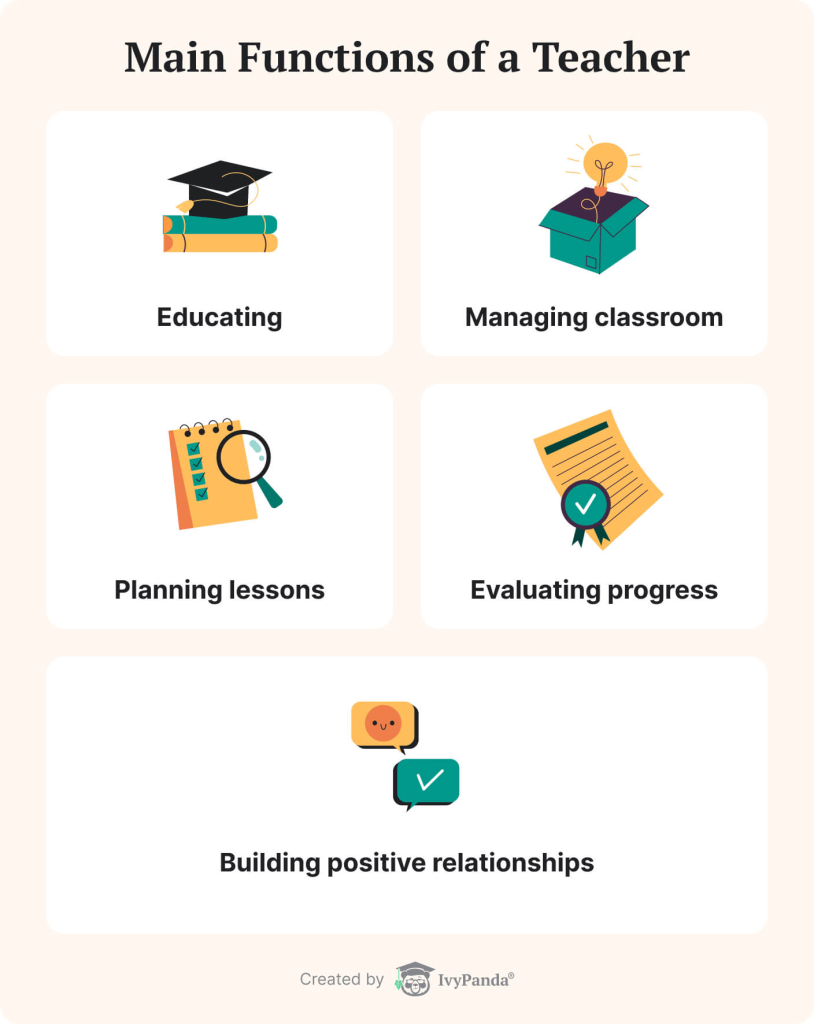
Educating Students
Good teachers are passionate about imparting knowledge and helping students succeed. Each educator may use different teaching methods, depending on the subject and teaching style.
The most important thing is to engage and motivate students to learn. After all, it is every teacher’s dream to pass on a lesson that will last a lifetime.
Managing Classrooms
Effective classroom management is another essential aspect of teaching. Educators are responsible for maintaining student discipline and ensuring the class is equipped with necessary supplies. This includes organizing materials, setting and reinforcing rules to establish expectations, and creating a positive atmosphere where students can thrive.
Planning Lessons
Teachers are usually responsible for designing a syllabus that aligns with the school’s curriculum and is tailored to the students’ needs. Conducting prior research and incorporating various teaching methods and materials may help create activities that motivate and engage students to learn more effectively. Teachers also need to ensure their explanations are easy to understand.
Communicating with the School Staff and Parents
Communicating with parents involves keeping them updated on their child’s progress and addressing their queries and concerns. Another key aspect involves fostering connections with fellow teachers. By sharing insights and resources, you can work collectively to meet students’ needs.
Constantly Growing
A teacher’s journey is one of constant evolution, both professional and personal:
- For professional growth, it’s essential to have a grasp of the latest teaching methods and technological advances, regularly attend workshops and conferences, and engage in self-reflection.
- Personal growth requires a willingness to learn from others, embrace feedback, and reflect on your teaching methods.
Teachers who engage in professional and personal development have top-notch skills and excel in their careers.
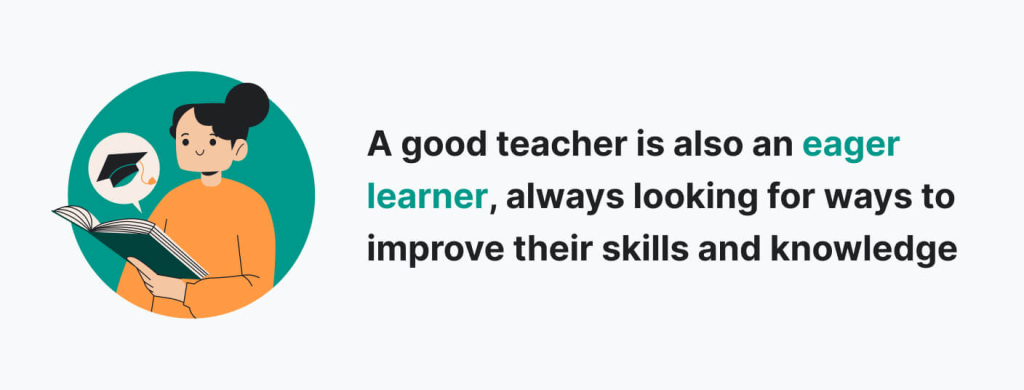
Building Positive Relationships with Students
To establish a connection with their students, a teacher needs to recognize their unique learning style and abilities, offer unwavering support, and cultivate an environment of trust and respect. Teachers can achieve this goal by relating interactive learning experiences with the help of diverse teaching methods and materials, such as hands-on activities and discussions.
Equally important is establishing a classroom ambiance where students feel secure and empowered to share ideas and take intellectual risks. This dynamic blend of relationship-building and engagement propels students and teachers toward academic achievements.
Using Technology
Technology is a fundamental part of today’s education. Teachers integrate technology into their classes in many ways, including presentations, 3D printers, smart classroom resources, and VR technology. A good teacher also has an understanding of the school’s digital tools and can guide students who may need help using them.
Evaluating Students’ Progress
Teachers can give quizzes, tests, and writing assignments to see how well students comprehend the subject. They can also change and adjust their teaching methods and techniques depending on students’ needs. Providing valuable feedback and informing parents about their kids’ academic progress is another essential aspect.
Preparing Students for Standardized Tests
Most educational systems incorporate standardized tests. Teachers can prepare students for these assessments by providing test-taking strategies, covering relevant content, and alleviating test-related anxiety. Their goal is to ensure students are well-prepared and confident on test day.
Supporting Students in Their Studies
Supporting students in their learning journey ranges from assisting them with school assignments to suggesting extracurricular activities, be it school clubs or after-school programs. By providing helpful advice and support, a teacher can ensure that all learners achieve academic success.
🧭 Is Teaching the Right Career for You?
Before picking teaching as your major, think about whether it’s something you enjoy doing and are enthusiastic about. If you want to succeed, it’s necessary to ensure that this profession is your calling.
Here’s a list of questions to help you: answer them with “yes” or “no.”
- Do you want to inspire others?
A teacher helps students with their academic achievements and works to positively affect their lives through words and actions. Consider whether it’s something you can succeed in. - Do you love learning and passing on knowledge?
Transferring knowledge, helping students grasp your subject, and conveying your experiences are the essential functions of any teacher. That’s why you should scrupulously weigh whether you are enthusiastic enough to teach students new skills and help them grow. - Are you deeply interested in one of your school or college subjects?
Teaching might be for you if you’re fascinated with a specific discipline and want to share your knowledge with others. Being a teacher allows you to dig into the topics you love and inspire children to learn more about them. - Are you resilient and adaptable?
A teacher must keep up with the busy education process, which requires energy and resilience. In addition, it’s significant to be multiskilled and open to continuous learning. - Are you okay with the salary?
Teacher income can vary based on the type of institution. For example, government schools typically offer better pay, benefits, and more flexibility than private ones. Your experience and qualifications also influence your wages. Remember that teachers make about 20% less than those with the same degree working in a different field. If money is important to you, it’s worth reviewing additional job options. - Are you committed to working after hours?
Unlike many jobs with fixed shifts, teaching may require extra work outside the classroom. Commitment to overtime is paramount, as it can seriously impact a teacher’s productivity. - Are you ready to handle troublesome classes?
Teaching is more stressful and arduous than many people assume, with around 44% of teachers leaving the profession within their first five years. The primary challenge is managing difficult classes and curriculum. Still, if you put in enough effort, you can learn how to deal with these problems. - Are you prepared to deal with exasperating parents?
Parents can either be a great support or pose a challenge for teachers. Some parents are highly cooperative. They aim to assist educators in helping their kids improve. Yet, others boss teachers around and criticize them for every minor issue. This dynamic can affect your job satisfaction. For that reason, teachers need to possess strong interpersonal skills to navigate complex situations. - Will you be able to earn the respect of your students?
It can be tricky to gain the respect of your students. It requires striking a balance between being strict and approachable. A teacher should aim to inspire curiosity and offer emotional support.
If you’ve answered “yes” to all the questions, congratulations – teaching is perfect for you!
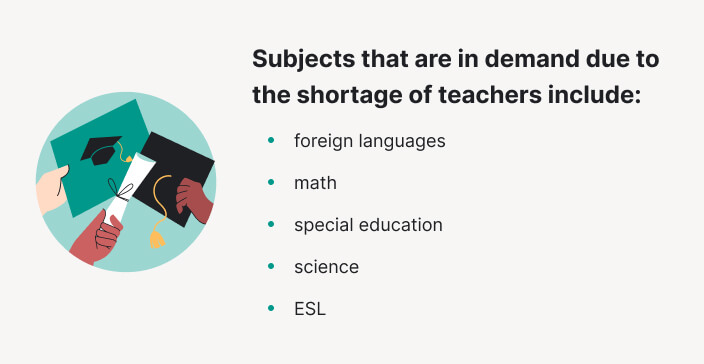
Skills & Qualities Required to Be a Good Teacher
Teaching is both rewarding and demanding. To be a great teacher, you need to possess certain qualities and skills. If you already have them, they will help you adapt to the job quickly and navigate it more easily.
Let’s start with the qualities:
- Patience. Teachers encounter various types of learners with different learning abilities. Being patient helps teachers provide the necessary support and allow students to grasp concepts at their own pace.
- Creativity. Creative teachers make their classes engaging and memorable. They find inventive ways to explain complex topics and design activities that cater to diverse learning styles. This helps them make studying more enjoyable and effective.
- Confidence. Confidence encourages trust and respect among students. A confident teacher can present the material effectively, handle any classroom, and create a secure learning environment.
- Self-discipline. Disciplined teachers set a good example for their students. They adhere to schedules and class plans, demonstrating the importance of consistency and structure.
- Empathy. Empathetic teachers understand their students better. It helps them tailor their approach to provide support and foster a better relationship with students.
- Open personality. Teachers who are open to others are approachable and adaptable. They welcome questions and discussions, which helps students feel comfortable to share their thoughts.
- Respectfulness. Teachers who have respect for others promote inclusivity and acceptance in the classroom. They also treat all students equally.
- Self-motivation. Self-motivated teachers are enthusiastic about their subject and everything they do. They inspire curiosity and determination in their students by setting a positive example.
- Emotional intelligence. Teachers with high levels of emotional intelligence are perceptive of their students’ feelings. They can effectively manage conflicts, recognize when students need emotional support, and maintain a harmonious learning environment.
Now let’s look at the skills that will help you be a great teacher:
- Excellent communication skills. Interpersonal skills will help you engage students and make your classes exciting. Verbal communication is vital for fostering a productive work environment, while good writing skills are key for creating reports and providing effective feedback.
- Critical thinking. Teachers should encourage students to think critically, analyze information, and be skeptical about what they read.
- Self-reflection. Self-reflection helps teachers continually improve their skills. By evaluating past lessons and approaches they’ve used, they can see if anything needs adjustments.
- Time management. Time management is a go-to skill for any educator, as they need to do so much while adhering to schedules and leaving for some free time.
- Cultural competence. This skill is essential for creating an inclusive environment. Good teachers make all students feel valued by understanding and respecting diverse backgrounds and perspectives.
- Organizational skills. Strong organizational skills help educators plan lessons, keep records, manage resources, and monitor students’ progress. Being organized also allows teachers to have well-structured, easily digestible classes.
- Deep knowledge of your subject. A deep understanding of the subject allows teachers to answer students’ tricky questions and ignite a passion for learning.
- Attention to detail. Teachers need to be attentive to correct all of the students’ mistakes and help learners follow instructions carefully.
- Active listening. Active listening allows teachers to comprehend other people’s needs and concerns. It promotes open communication and helps build strong teacher-student relationships.
Teaching is perfect for you if you have all these skills. Besides, you can always develop them by volunteering or participating in various projects that allow you to gain experience.
Possible Difficulties to Keep in Mind
Teaching is a gratifying profession but also one of the most exhausting ones. As a future teacher, you may face obstacles, including the following:
- Extra duties. Be ready to have additional responsibilities beyond classroom teaching. These may include meeting attendance, extracurricular activity management, and participation in professional development.
- Long work hours. Teachers spend hours arranging materials and grading assignments. It can result in long workdays and less personal time.
- No paid holidays. Unlike some professions, teachers may not get holiday compensation. They need to save up for unpaid breaks during the school year.
- Taking work home. Many teachers bring work home on weekends to keep up with grading, lesson planning, and other tasks, which can affect work-life balance.
- Maintaining an image. Teachers are traditionally seen as role models, so they have to maintain a perfectly professional image even when they’re not in school.
- Moderate salary. Teachers may have a relatively lower wage than other professions, forcing some educators to take up tutoring or additional jobs.
- Stress. Educating and managing a classroom of diverse students can be stressful. This stress largely contributes to high turnover rates in the profession. The 2022 RAND survey reports some alarming statistics: 58% of teachers often experience job-related stress, with 1 in 6 teachers being especially distressed by the influence of politics on teaching.
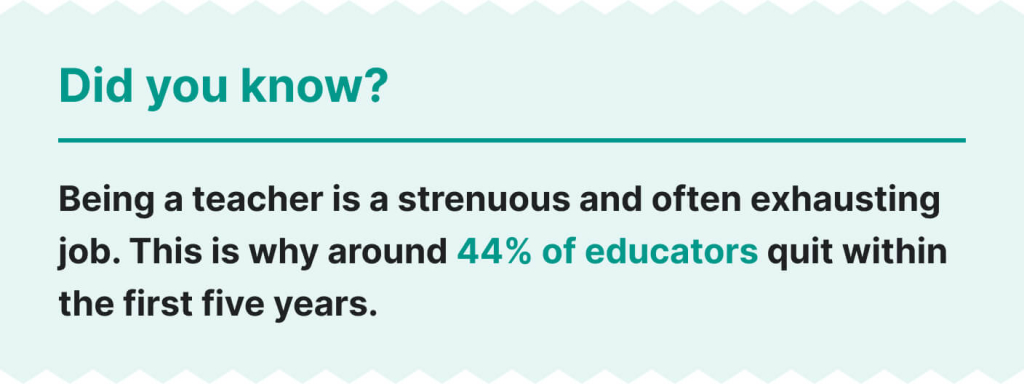
⏳ How Long Does It Take to Become a Teacher?
If you’re enthusiastic about teaching, you may want to start immediately. But hold on – it’s not as easy as it seems!
As a minimum requirement, future teachers must secure a bachelor’s degree to qualify for certification. And that usually takes four years. Specific teaching fields also offer master’s degree programs. Typically, a standard master’s degree in education is a 2-year course. Some institutions provide accelerated alternatives that can be finished in approximately 12 months.
✅ How to Become a Teacher: Step-by-Step Guide
Now, let’s learn how to become a professional teacher. Generally speaking, you only need a degree, some teaching practice, and a state-approved license. If you possess a degree in some other field, there’s another method to receive a certificate. Sounds interesting? Then keep reading!

Step 1: Be 100% Sure You Want to Be a Teacher
As we’ve noted before, teaching is not for everyone. Nevertheless, if it is your vocation, and you have all the required skills, then certainly give it a go.
You can become more assured by gaining experience beforehand. For instance, you may volunteer, do some job shadowing, or work as a substitute. This way, you can get a real taste of what it’s like to be a teacher.
Step 2: Determine Whom You Want to Teach
Before pursuing a career in education, decide what and to whom you want to teach. While choosing a subject to specialize in is pretty easy, things are more complex when determining who your future students should be.
Depending on their age, you’ll have different responsibilities and approaches:
- Teaching younger kids, like those in preschool and elementary, involves a broader range of subjects, so you need to be acquainted with many topics.
- Teaching older students from middle school onwards allows you to specialize in particular subjects.
There’s also the option of teaching students with special needs, which is more about individual approach and emotional support.
Step 3: Explore Available Teaching Degrees
There are various degrees in education, and identifying what’s optimal for you is paramount. Here’s a list of the top 10 degrees you can select from:
- Associate degree in education.
This two-year program introduces educational theory and prepares a general foundation for teaching. It’s often pursued before applying for a bachelor’s degree. - Bachelor’s degree in early childhood education.
This four-year program revolves around child development and curriculum creation for young kids. It’s commonly required for preschool teachers. - Bachelor’s degree in elementary education.
Concentrating on kindergarten through to 6th grade, this option provides a foundation for teaching math, science, and language. This degree is essential for elementary educators. - Bachelor’s degree in secondary education.
Tailored for 6th through 12th grade, it commonly pairs with a subject major, helping educators prepare for middle and high school teaching. - Bachelor’s degree in special education.
This degree involves an in-depth study of developmental delays, child psychology, and diverse student populations. Unlike other degrees, it focuses on working with individualized education plans. - Master’s degree in curriculum design.
This advanced degree allows the creation of educational standards. It normally takes 1-2 years and creates administrative opportunities. - Master’s degree in reading.
This degree is designed for reading specialists or curriculum designers in elementary schools. It enhances career options and may lead to higher salaries. - Master’s degree in instructional design.
This degree concentrates on classroom and distance learning. It prepares educators for digital course creation and online teaching. - Educational specialist degree in educational leadership.
This post-graduate degree concentrates on research and instructional leadership. It offers specialization beyond a master’s degree. - Doctoral degree in education.
Doctoral degree would be an awesome choice if you wish to be an administrator or college professor. Keep in mind that it requires a substantial time commitment and often requires prior teaching background and specialized research.
Check out U.S. News’ list of colleges offering an education major to find the best option for you.
Step 4: Decide How You Want to Study
There are several ways to obtain a degree in teaching, each with its benefits and drawbacks. Choose the one that fits you the best!
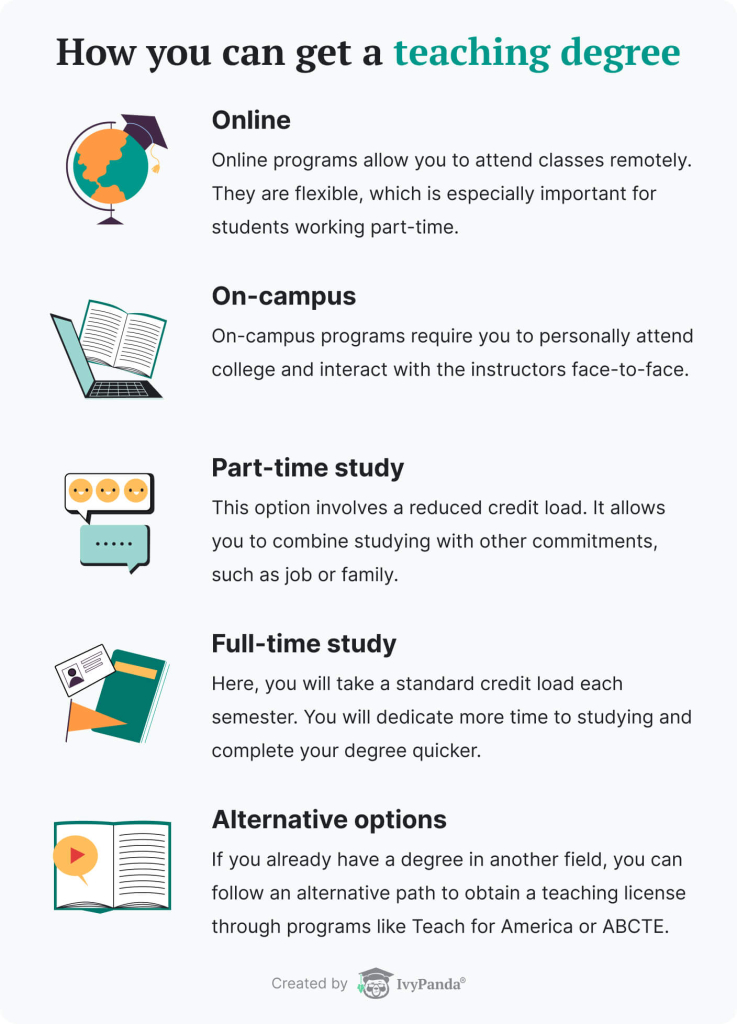
Online vs. On-Campus
Attending in-person classes lets you communicate with new, exciting people face-to-face. Meanwhile, online learning is superb for those who want an adaptable timetable and study at a quicker pace. Still, even with virtual lectures, you’ll still have to attend practical lessons to gain experience working with students.
Part-Time vs. Full-Time
Depending on the amount of time you can dedicate to your learning, you may pick a part-time or full-time option. The distinction lies in the credit load, which is either reduced or standard. Part-time studying is convenient, but if you choose it, it will take you longer to achieve your degree.
Alternative Teaching Certification
Remember when we said there’s another way for those with a degree in a different field? This certification is what we were speaking about.
One of the best things about becoming a teacher is that it doesn’t require from you a degree in education. All you need to do is go through the teacher preparation program, gain some experience, and get your license. There are plenty of routes to choose from, such as ABCTE, Teach for America, and TNTP Teaching Fellows.
If you already have a degree in the study area you plan to teach, you can complete a single-subject teaching degree. You may also acquire a master’s degree in addition to the bachelor’s one you already have. It will permit you to teach any subject you want. We advise checking your state’s demands if you choose the latter possibility, as there may be considerable differences.
Step 5: Apply for a Teaching Program
When applying for a teaching degree, it’s crucial to ensure that you fulfill all required credits and courses. Here are the basic application requirements:
- Bachelor of Education. It’s a 4-year program that often involves certification tests. These are the application prerequisites:
- SAT/ACT scores
- High school grades
- Application fee
- Some schools might ask for recommendation letters and specific high school GPAs or courses.
- Master of Education. It takes between 1 and 2 years to obtain this diploma. Most of the time, online and evening programs are available. To apply, you’ll need the following:
- Recommendation letters
- Application
- Application fee
- Personal statement
- Transcript from undergraduate college or university
- Some schools may have a minimum GPA requirement, conduct interviews, and ask for a resume or a copy of a teaching certificate.
- Alternative Teaching Certification. This certification suits those with a bachelor’s degree in a different field. The program offers a mix of education and practice and may lead to a master’s degree. The demands include:
- Bachelor’s degree
- Application
- Transcript from an undergraduate college or university
- Literacy test scores
- Sometimes, a recommendation letter or a resume.
Step 6: Finish the Coursework
Coursework is the theoretical part of a teacher’s education. It can vary but typically includes subjects like education theory and child development.
Specializations such as Early Childhood involve classes like Art and Music. Teachers who work with older students focus more on one specific subject. However, disciplines such as Development in Children, Oral and Written Communication, Introduction to Psychology, Learning and Inclusion, and Curriculum Design are required for everyone.
Step 7: Pass the Exams
Prospective teachers are expected to pass an exam at the end of the education process. The test may differ depending on the state, Praxis being the most popular. There are three types of Praxis tests: the Praxis Content Knowledge for Teaching Assessments, the Praxis Core Academic Skills for Educators (Core,) and the Praxis Subject Assessments.
A few states don’t use the Praxis series and have their own tests, such as edTPA. The tests typically cost between $150 and $300.
Step 8: Complete the Student Teaching
After you finish the exams, you’ll have to gain some practical experience before getting your degree. This includes teaching in a public school while being supervised. During student teaching, which can last one or two semesters, you’ll actively teach the class and receive feedback and evaluations that can help you assess and improve your skills.
To begin this part of the program, you must be in your final year of studies, pass state-specific teaching exams, maintain a minimum GPA, get approval from program faculty, and meet a minimum program duration requirement. You also need to pass a background check and a medical exam.
Here are some valuable tips on how to complete the student teaching process successfully:
- Meet with your cooperative teacher. At the beginning of your student teaching experience, it’s crucial to establish a strong relationship with your supervisor. Regular meetings will allow you to discuss lesson plans, classroom management, and student engagement strategies. This collaborative approach will help you both work together effectively.
- Set your expectations. Discuss goals, responsibilities, and your role in the classroom with your cooperative teacher. Setting these expectations from the start helps create a positive and productive learning environment.
- Familiarize yourself with the school manual. Take your time to read and understand the school’s general guidelines. It will help you navigate daily routines and smoothly integrate into the school community.
- Get to know the classroom. Thoroughly explore the classroom and its resources to create an organized and welcoming environment for your students.
- Ask for feedback. Constructive criticism and guidance can help you improve your teaching methods and classroom management. If you’re willing to learn from experienced educators, you will definitely succeed in student teaching.
And here are some extra dos and don’ts that can help you get the most out of your practical experience:
Step 9: Get a Teaching Certificate
A teaching license, sometimes called a certification or qualification, is a necessary credential to work as a teacher. It’s typically obtained from your home state or country’s educational authority. This accreditation permits you to teach in a specific region or globally, depending on its type.
Teaching certification involves background checks, including criminal history checks, professional license verification, and degree validity. They are generally affordable and cost around $20 each. Furthermore, drug tests are often mandatory, with some schools even testing their current workers. Potential teachers are also required to have or acquire a master’s degree within the first five years.
Here are the main types of certifications you may need to know about:
- Elementary and Middle School Teaching Credentials are for generalists, enabling them to teach multiple subjects.
- Teaching Certificates and Endorsements in Secondary Education require future educators to demonstrate that they are highly qualified in specific subjects they wish to teach.
- Teacher Certification for Specific Subject Areas focuses more on subjects than age groups, which makes subject-based certification a practical option. It allows teachers to work with kindergarten to 12th-grade students based on their school district’s needs.
Keep in mind that a teacher needs to renew their license every five years. If you continue improving your skills and growing professionally, you will have no trouble with that.
Step 10: Continue Your Higher Education
Accomplishing all the steps we’ve just described doesn’t mean you have to stop there. You may also consider getting a Master’s degree or pursuing your Ph.D. to find a more profitable position and become a valuable professional. Besides, teachers who have such diplomas usually get bigger paychecks. We encourage you to continue your studies after earning your bachelor’s degree. Trust us, it will be worth it.
🎯 Strategies for Finding Your First Teaching Job
Finally, you’re ready to start your teaching journey and search for your first job! It’s a nerve-wracking process, but worry not – we will clarify how to job hunt effectively and give valuable recommendations.
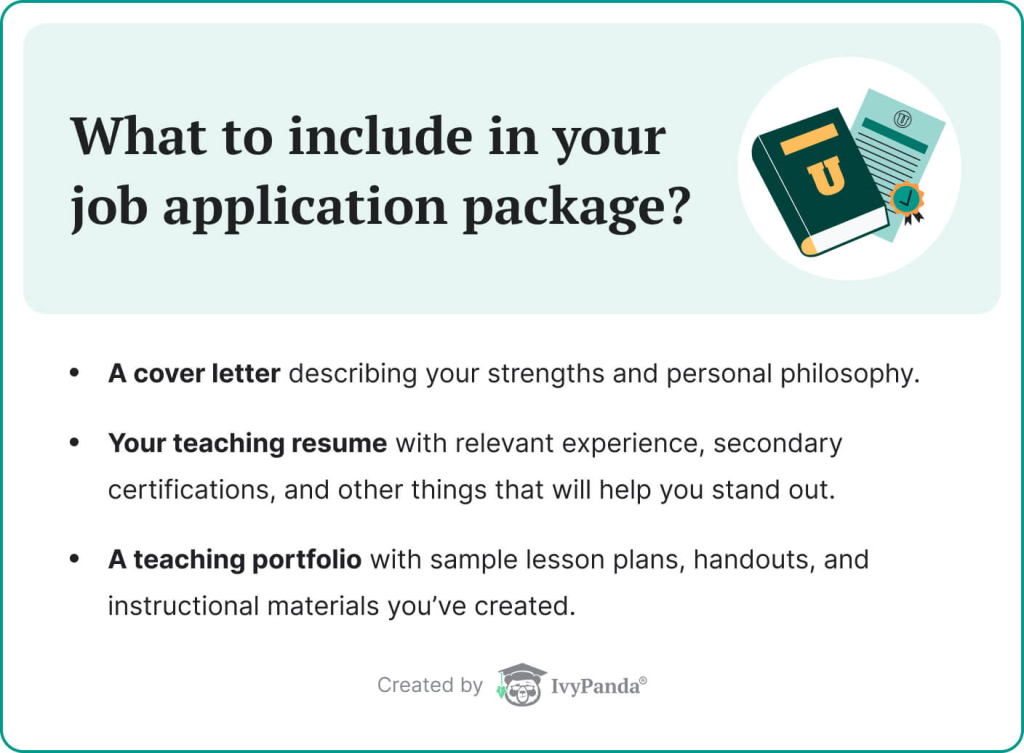
Make Use of Job Boards
There are several ways to search for teaching job opportunities:
- One option is using general job boards like Indeed, LinkedIn, Handshake, or Glassdoor.
- Another option is niche job boards, which cater to specific industries and offer specialized options for educators. Popular niche job sites for teaching positions include AcademicKeys, HigherEdJobs, and Teachers-Teachers.
- For a more targeted approach, you can explore the websites of individual schools and school districts.
Prepare the Necessary Documents
Creating a solid application package is vital for a successful job hunt. Let’s see what it should include:
- Start with a well-crafted cover letter underlining your strengths, educational philosophy, and passion for teaching.
- Your resume should emphasize relevant experiences and qualifications. Keep it concise and pertinent. You can also showcase secondary certifications, memberships, volunteer work, and ongoing professional development.
- Your teaching portfolio, which evolves as your career progresses, should contain various documents illustrating your approach and its results. It might include descriptions of courses you’ve taught, lesson plans, student evaluations, and examples of students’ work.
Tip: To increase the chances of getting an interview, tailor your resume, teaching philosophy, and cover letter to match the qualifications and preferences of each job you apply for. This way, you’ll show potential employers you’re a perfect fit for their school.
Research & Network
After you’ve found the school you want to apply to, do some research and gather plenty of information about it. Talking to other employees or students may give you a better idea of the establishment and what they seek in a teacher. You can also check out the school’s website and programs to see if you meet all their requirements.
Get Ready for the Interview
Preparing for teaching job interviews is crucial for securing the position you desire. Confidence and knowledge of your weaknesses and strengths are essential during face-to-face meetings. Be prepared to answer questions on different topics, including classroom management, technology, and your role in the school.
In addition to your theoretical knowledge, some employers may want to see how well you fit into the school’s culture. If you’re asked to perform a teaching demonstration during the interview, make sure you discuss it beforehand. During the demonstration, showcase your presentation skills and ability to cater to diverse student needs.
🎁 BONUS: Best Tips for Thriving as a New Teacher
Congratulations on starting your teaching career! This beginning period is exciting but also challenging. To make your first days at a new job easier, we’ve prepared a list of bonus tips from successful teachers. Check them out below to learn the insights you won’t find anywhere else!
Don’t Be Afraid to Seek Guidance
The first year of teaching can be filled with questions, from understanding onboarding processes to handling difficult parent calls. Having a good mentor will make this transitional period much more manageable. Here’s what we recommend:
- Seek guidance from an experienced teacher at your school. You may also reach out to your former teachers to see if they can guide you along the way.
- Before the school year begins, establish a system for checking in with your mentor regularly. This support can make your first year easier to navigate.
- If you feel shy asking many questions throughout the day, create a list and ask them all at once after work.
Be Kind to Yourself
During your first year of teaching, each day brings new experiences and challenges. It’s important to set achievable goals and acknowledge your growth and improvements. For example, you can create a diary where you keep track of your progress and celebrate achievements. It’ll help you stay motivated and avoid being overly self-critical.
Find Opportunities to Earn Extra Money
Even though schools don’t always offer the highest salaries, they give teachers many opportunities to earn extra cash: Signing up for additional work or coaching as a club instructor is one such opportunity. Teachers can also make additional money through tutoring or substituting for other teachers during holidays.
Get Organized
Being organized is essential for a teacher. Planning classes, keeping up with grading, attending meetings, and having time to rest requires organization and time management. You can create plan books, diaries, and organizers to keep track of all your responsibilities. Experienced teachers also recommend using apps like Seesaw, Remind, Pocket, TeacherKit, and Trello.
Develop Strong Bonds with Students
Building good relationships with your students is crucial for new teachers. Getting to know students individually may help you create a stronger bond with them. It will also aid you in creating a more welcoming atmosphere in the class – one where everyone is willing to share their thoughts and contribute to the discussion.
Use Different Teaching Strategies
Adjusting your teaching methods will help you find the approach that resonates best with your students and helps them grasp the material more effectively. Great teachers continually seek fresh, imaginative techniques to engage their students and facilitate learning. For instance, you might use visual aids or hands-on activities to assist students who find traditional lectures or reading assignments challenging.
Maintain Work-Life Balance
Finding a life-work balance is the only way to avoid burning out. It’s especially important for teachers who are increasingly burnt out due to extremely high expectations and overwhelming workloads. Saying “no” when you’re exhausted is an essential skill. If you don’t have time to rest, you’ll eventually become irritable, which may negatively affect your students and coworkers.
Prioritize Self-Care
Taking care of yourself is extremely important for those who take care of others. As a teacher, you need to find time to relax and do things that bring you joy. Spending time with family and friends or doing sports in your free time can help you maintain your spirit and continue to be an excellent example to your students.
We hope that you’ve found our article helpful. Feel free to share it with your friends. We wish you all the best on your teaching journey!
🔗 References
- Teaching for a Living: Career Outlook: U.S. Bureau of Labor Statistics
- Become a Teacher after College: NYU Steinhardt
- Why Become a Teacher? 8 Benefits to Consider: Drexel University
- Career Paths for Different Types of Teachers: What to Know: Forbes
- How to Become a Teacher: The University of Kansas
- How to Land Your First Teaching Job: ThoughtCo
- 8 Tips for Finding Teaching Jobs You’ll Love: We Are Teachers
- How to Find Your Dream Teaching Job: Edutopia
- Helping New Teachers Thrive: Harvard Graduate School of Education
- Advantages & Disadvantages of Becoming a Teacher: Chron.com
- Pathways to Teaching: North Carolina Department of Public Instruction
![The Ultimate Guide to Starting a Teaching Career [+Infographic]](https://ivypanda.com/blog/wp-content/uploads/2023/12/woman-teacher-writed-mathematical-formulas-blackboard-explain-lesson-school-736x491.jpg)

![How to Write a CV: 11 Useful Tips [Infographic]](https://ivypanda.com/blog/wp-content/uploads/2020/11/company-human-resource-hr-is-holding-resume-application-tablet-hand-309x208.jpg)
